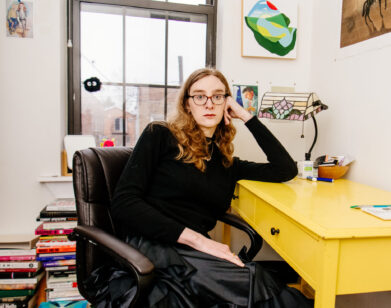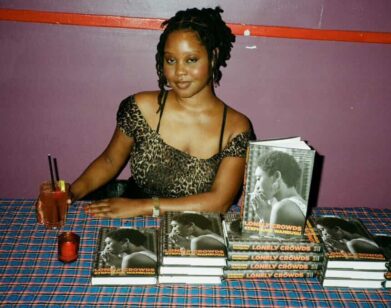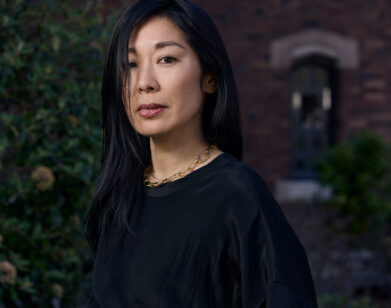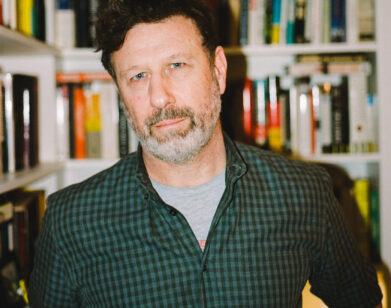LIT
Maya Binyam Tells Tavi Gevinson About Her Searching Debut Novel Hangman
My friendship with Maya Binyam started with circuitous walks and lengthy text threads. Some of these early lines of inquiry have extended for years now, with Maya often finding the better and more interesting questions. I can rely on her to look at a thing with both compassion and irreverence, reminding me that moral clarity and a respect for ambiguity can coexist. Also, I’ve had to retire the cliche that hearing about other people’s dreams is boring, only because Maya’s are so well-told.
When I first met Maya, I knew she’d edited the personally formative Too Much and Not the Mood by Durga Chew-Bose, and co-created Bailbloc, which raised money for bail funds through computer power. Her nonfiction work–on the individualist conditioning of freelance writing and institutional settings, in particular–have helped me better understand my jobs as an actor and a writer. I love knowing that someone so smart also believes that people are capable of transforming ourselves and the world—and that this process is often made possible through writing and reading.
Maya’s debut novel Hangman comes out today, and it is a ride. It’s got a narrator I kept changing my mind about, shifts from thriller to farce, a full-body penny drop, and an ending that made the penny shoot back up with new meaning. Narrated by a man returning to Sub-Saharan Africa after 26 years in the U.S., the book is a lucid telling of mystifying encounters. With the lightest touch and absurdist humor, Maya traces those invisible forces that often pass for, and so create, reality: projection, denial, the shape of history, and the psychic repercussions of structural violence.
When I returned to my own writing in the days after finishing it, I noticed myself asking better questions: “Was that really what I felt? Saw? Understood? If not, how do I refind the sensation, and why’d my brain try to change it?” I was still living with the strange beauty of the narrator’s voice, of Maya’s discoveries. So, just before Hangman’s release, we Zoomed from our respective family visits to talk about how she did it.
———
TAVI GEVINSON: Hi.
MAYA BINYAM: Hi. Are you in Michigan right now?
GEVINSON: Yeah.
BINYAM: Okay, cool. We’re in similarly wooded areas.
GEVINSON: There’s so much I want to talk to you about. I have prepared questions and everything. Real questions.
BINYAM: Okay. Amazing.
GEVINSON: How do you feel with the book coming out in a couple weeks?
BINYAM: I feel good, mostly. I’ve accepted the fact of it coming out as opposed to it being something that was purely speculative. And accepting that fact required confronting a lot of dread, which was surprising to me. But I feel good. I feel excited. And I feel especially excited to have conversations like these. I feel like I had mentioned to you that there was something very sad to me about the book no longer being a living document on my computer, and that it felt dead just at the moment at which other people were going to be encountering it. And I’ve found that by talking to people and learning things about the book and the narrator through their reactions, it’s had a new life that’s different from the life that I knew.
GEVINSON: Does it transform that sense of loss into a more useful or interesting emotional distance?
BINYAM: Yeah. I get to be a reader now. I’m not a reader in the conventional sense, but I get to be a reader in the sense that I can interpret the text in a way that I couldn’t do while I was editing it.
GEVINSON: I feel like when we’ve talked about it—because we had had conversations that were thematically related to the book, somewhat—as your friend, I was like, “Were you thinking about this?” And you were like, “I wasn’t consciously doing those things.” And I think it’s actually not your job to be consciously injecting [the book with] higher concepts, anyway.
BINYAM: In writing this, a lot of the questions that are typically front of mind for me as I’m moving about the world were able to fall into the background and I was able to write on impulse, I guess. But then, of course, all of the things that I’m typically thinking about are made manifest. I had the experience when I was writing the book where, I don’t know, I think I wrote it unemotionally, and I wasn’t affected by it until after it was written and even after I had edited it. So a lot of the affective stuff, it wasn’t as present for me when I was writing. And then once I had filed the book away as a finished thing, I was more emotionally and intellectually affected by the ideas that existed within it.
GEVINSON: I think maybe there’s a similar cliche around writing a novel as there is with acting. At times I’ve imagined that novelists think they’re the character and they’re living and feeling what the character is, or the narrator. And I think whatever that alchemical process is that you’re describing is way less direct than that. But you’re one of the only people I know who wrote something in one fell swoop.
BINYAM: Yeah, I wrote the first draft of the novel while I was at a residency in the Adirondacks where all of my daily needs were tended to. A very good chef was cooking all of the meals and there were beautiful places to work and hike and swim. I also didn’t have access to the internet or my phone. So all of those things were very, very strong enabling factors. I don’t typically find it easy to write quickly in my daily life, which is filled with all sorts of interruptions, as it is for almost all of us. I didn’t necessarily expect to write this book while I was there. I had intended to work on something else that I had been trudging through, but I was without the things that normally tether me to the world. At the same time, my capacities for observation were totally heightened because I was around 10 new strangers who I didn’t have any significant connection to. And I found that that combination of things very fruitful for entering a new space in that empty time within my days. I didn’t feel like I was entering the world of the character or I was living life as the narrator, but I did feel like—and I’m curious if this happens with you for acting—his style of observation or his style of speech infiltrated how I was moving about this space. I was writing a lot of emails to friends at the time, and I found that the way I was writing those emails was really mimicking how I was writing the novel.
GEVINSON: When I was younger, I thought that that was supposed to happen with acting and that you would literally think you were someone else or something. And it’s more like how a song gets stuck in your head. You said that these questions you normally have receded while you were working on this. And I wonder what those questions usually are.
BINYAM: Well, there are the questions that didn’t make themselves manifest in the book, like, “How am I feeling right now? What am I going to eat today? Who do I have to see today? What emails do I have to send?” All of those daily things obviously fell away. But I think what I meant there was, the questions that maybe originated within my life from personal experience. For example, I’ve been thinking for a long time about the ideals that attend the idea of refuge, which is a political term that has no formal legally binding definition but nevertheless conjures a place that signifies safety, livelihood, life itself. My father came to the U.S. as a refugee. Many people on his side of the family have found refuge here. For most of my life, my mother was an immigration attorney and an immigration judge, so she was thinking a lot about refuge from a legal perspective. And growing up, I was experiencing refuge as it existed as a legal idea and refuge as an embodied experience, and oftentimes those two things were in conflict with each other. That’s something that I’ve been trying to think through for a long time, how the ideals of refuge conflict with the actual experience of it, especially for people that have come to the U.S. as Black immigrants, for whom the U.S. remains a site of persecution. I didn’t go into the book with that on my mind. And there are other questions that aren’t so expressly political. The book feels like a ledger of what was happening with me subconsciously in that period of my life.
GEVINSON: One of the things I really love about Hangman is how it shows the way political forces not only shape dominant historical narratives, but the very notion of history or refuge. And the novel—not yours specifically, but the novel more generally—is a site where many assumptions about neutrality or objectivity become illuminated, intentionally or not. I’m curious, once you started to detect these ideas in the book, were you writing toward a thesis, or editing with specific questions in mind?
BINYAM: One thing I’ll say is, it became clear to me as I was writing that the narrator did not have a writerly sensibility. He’s very reluctant to find meaning in the things that he’s encountering in his everyday life. He wants things to be what they are. And in that way, he doesn’t really have a symbolic understanding. He’s very insistent that things be what they are, that people be separate from him, that their stories have very little to do with the story that he tells about himself, which in any case is extremely fractured and kind of minimal. And so that also became a challenge to me, to write something that was explicitly literary from the perspective of someone who is an extremely reluctant narrator of his own own life, someone who’s adamant about meaning not existing. That is not to say the book is without symbolism. But I was interested in how objects could accrue symbolic meaning through repetition, through appearing in places where they shouldn’t be. Does that answer your question?
GEVINSON: I don’t even remember what I asked, but I think you should keep going.
BINYAM: Okay, cool. But I do think that that was something that I was thinking a lot about while I was editing. There are, for example, no metaphors in the book, and that was something that became important to me as I was trying to write through the narrator’s consciousness. When I first wrote a draft, there were lots of things that were obscured that didn’t need to be obscured. And so editing was a process of figuring out what information had been obscured through sloppiness on my part. And what would the narrator ultimately be unwilling to reveal? Something else that was tricky is that there are so many levels of information throughout the text. There’s what the narrator knows but isn’t willing to reveal to the reader or anyone he encounters. There are things that the reader believes that they know that the narrator doesn’t know about himself. There are the things that other characters and the text know about him and try to tell him, but which he doesn’t accept as true. And that was all tricky to balance.
GEVINSON: One of the things I really responded to is that the reader isn’t immediately equipped with the kinds of details that are superficially thought to constitute a character’s backstory, which is something we also never talk about in life. And also, without being didactic, the book poses these political questions while feeling very immersed in his consciousness. And it made me wonder if you are familiar with the argument that the novel growing in popularity and cultural importance provided some of the ideological scaffolding for penitentiary expansion in the 18th century? Are you familiar with this study?
BINYAM: Oh, no. Tell me about it.
GEVINSON: It’s a study from the ’80s by John Bender, and which I have not read, but I became familiar with it through Angela Davis’ short book on prisons. And it basically argues that novels were seen as a testament to the power of confinement to reform people that, quoting Davis, “It ordered and classified social life and represented individuals as conscious of their surroundings and as self-aware and self fashioning, which helped to popularize ideas that then shaped the prison system and made it appear as a site of personal reform.” So I had been reading that book and your book, because I usually have fiction and a nonfiction going at the same time, and it made me think about how there are these expectations that one has with a novel that come out of that tradition, ideas about character and identity that teach the reader to expect certain biographical details.
BINYAM: That’s really interesting to me. It’s very confusing to me, the relationship between biographical details, factual things that have happened, and psychology or consciousness. Those things are often presented in a clinical context as having a one-to-one relationship. And I think any of us who have lived life know that isn’t the case, but we nevertheless reach for that kind of connection. I find myself doing it in my own life when I’m trying to figure out why I am the way I am. I’m like, “Oh, maybe it’s because this thing happened in my childhood,” or whatever. And in a novel, especially one that’s as fixated on a character’s psychology as this one, it’s very tempting to draw those kinds of relationships. And I’m interested in the tension between those two things. The fact that the narrator was a political prisoner is obviously conditioning, but it’s also a biographical detail that’s seismic and not really explored in the text. And that’s in part because there are things, I think, that language fails completely to represent. The narrator shares a bunch of biographical details with my father, who was likewise a political prisoner in Ethiopia and fled to the U.S. as a refugee in the ’80s. And he talks very little about his time in prison. Sometimes he describes it in a way that does function as a kind of explanation for how he is now. But oftentimes, it’s like the weather. And as a writer, I seek desperately to understand it, and language is the tool that I have. Maybe if I was more historically or sociologically minded, I would be more inclined to try to conjure through language the experience itself. But that’s completely uninteresting to me, I guess.
GEVINSON: I felt like it subverts, in various very smart and subtle and not didactic ways, a few of the ideals we’re talking about, this 18th century novel ideal of self-reflection and self-reform, the idea that to be able to classify oneself among society somehow has some kind of moral value. I love reading novels because I love feeling like I’m in someone else’s mind. But also, part of life is that you cannot be in everyone’s mind, and we ourselves don’t even have the language or understanding a lot of the time to understand any of the causal relationships between what we’re thinking and what we might actually be going through. Almost in the way that you wrote this and then you were like, “Oh, this is very related to my family.” In the acknowledgements, you say that your dad’s storytelling is why you’re a writer, and I wanted to know more about that.
BINYAM: My dad is someone who tends to speak anecdotally a lot of the time, and a lot of the anecdotes have a mythic quality to them. It’s almost impossible to know when he’s going to feel like talking. He’s not a garrulous person. He talks extremely intentionally and somewhat mystifyingly. And it’s funny to be talking about him because he is a very private person, which gives off the sense that he has this deep, deep well of experience and stories within. And my experience of childhood was that my father was a very mysterious person, but that he would at any point tell these very potent stories that would be revealing. They would either reveal something about him, some crazy thing that he had experienced that I couldn’t even imagine in the context of my own life, or that would reveal a real lesson about how to be in the world. I am very attached to that mode of storytelling and very hungry for it. And I have a real feeling that his stories are important, that they carry wisdom and I want to write them down. I want there to be some record. And a number of the accessory stories that appear in Hangman are told in a way that mimics almost exactly the way that they’d been told to me in the first chapter. There’s the young boy who drops out of school after he’s been jilted in love and gets good at shooting guns and discovers that he can get anyone to give him anything so long as he threatens them with the gun. But he doesn’t really have an ideology. He just goes about intimidating people until he’s ultimately hanged. That story is a story that was relayed to me almost exactly about my father’s cousin, who is someone that he knew quite well and who was a mythic figure within the family. So yeah, it’s those two things: wanting to have some record of the stories I’ve been told, and then having the desire to conjure something in their absence, I guess.
GEVINSON: That was beautiful.
BINYAM: This is also why we typically speak for five hours every time.
GEVINSON: And then emails sent afterwards.







